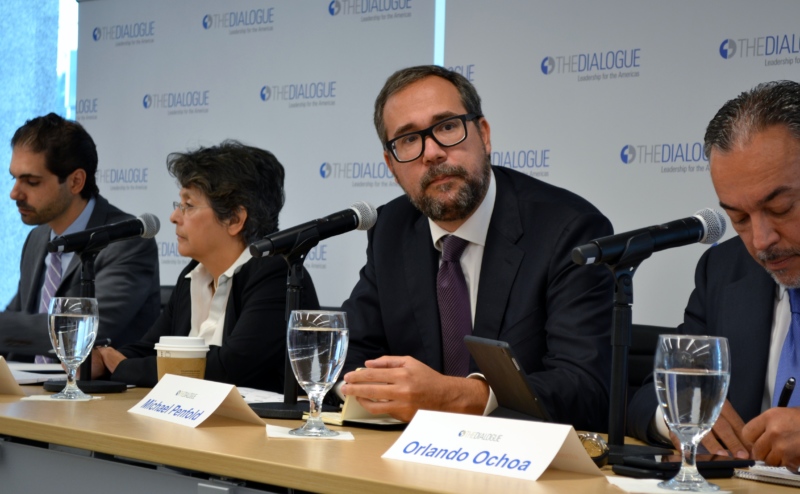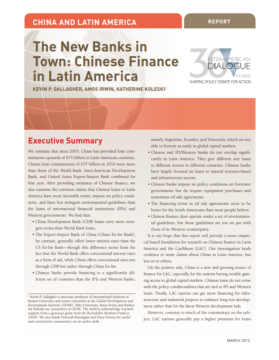Hugo Stay Home
Hugo Chavez, the Venezuelan president, has clearly been enticed by the Libyan drama, where his longtime friend and ally, Muammar al-Qaddafi, is under siege from rebel forces.
On May 3, the Inter-American Dialogue in partnership with the Institute for Integrated Transitions (IFIT) hosted an event titled “Inside Perspectives on Possible Scenarios in Venezuela”. This discussion, moderated by Michael Camilleri, featured panelists Margarita López Maya from Tulane University, Michael Penfold from the Instituto de Estudios Superiores de Administración, and Orlando Ochoa, an independent economist and consultant. The conversation explored the situation in Venezuela and offered possible scenarios for the near term including their expected risks, opportunities, and trend lines.
Penfold began by noting five particular constraints Venezuela will have to face in order to recover from decades of decline. First, the country will need to stabilize its economy by stopping hyperinflation. Next, the government will have to reverse the oil collapse. However, in order for this to occur, the country needs access to international markets and financing. Venezuela will have to address the increasing social emergency, which is reflected in the largest refugee crisis in the Western Hemisphere the region has ever seen. Those that remain in the country are also addressing social issues through protests. Although the government has been successful at containing them, social protests have increased almost tenfold compared to last year. The fourth constraint the country will need to tackle is citizen security due to rising organized crime. Lastly, Venezuela will have to surpass the challenges of rebuilding democracy and peace. Penfold claimed that this would require a high degree of cooperation, both with the international community and within the country itself.
“I’m not optimistic, but I think we have to keep moving forward.” -@mlopezmaya #DiálogoIFIT
— The Inter-American Dialogue (@The_Dialogue) May 3, 2018
Find out why: https://t.co/xvf0DsGKvs pic.twitter.com/fJTFrdMmnx
Next, López Maya discussed the types of possible scenarios in Venezuela. There are unpredictable scenarios, such as a military coup sparked by social unrest, unlikely scenarios, like the restoration of democracy, and likely scenarios, including Maduro remaining in power. However, it is imperative that the country think about a strategic long-term plan and agenda following the end of Venezuela’s dire situation. López Maya pointed to two obstacles that need to be tackled in order to achieve stability. To begin with, it is critical to end the political polarization that has plagued the country for the last 20 years. Venezuela will also have to restore and repair liberal institutions and checks and balances, particularly the judiciary.
Ochoa then focused on describing how Venezuela’s historic dependence on oil led to its own demise. What had once been one of the poorest countries in the region turned into a booming economy in a period characterized by fiscal discipline and macroeconomic stability. However, this golden age only lasted until the 1970s when the government became involved and formed an inward state-led strategy. Essentially, although Venezuela has the largest oil reserves in the world, it is political risk that is holding the country back. Ochoa suggested that the solution to repair the oil sector is to look outward and receive international support to fund the fiscal deficit. Once tensions decline, the country should capitalize on its oil partners in China, India and the US, which would help relieve the burden of the IMF and other agencies. Internally, PDVSA will have to reorganize and create contracts with third parties. This approach is viewed positively by a large portion of experts in Caracas.
Overall, the panelists agreed that regime continuity is likely, but that growing national discontent and escalating international sanctions will continue putting pressure on Maduro. The elections on May 20 could become a turning point in that regard. The experts also underscored the need for cooperation when the time to rebuild Venezuela arises.
Hugo Chavez, the Venezuelan president, has clearly been enticed by the Libyan drama, where his longtime friend and ally, Muammar al-Qaddafi, is under siege from rebel forces.
Estimates of the volume, composition, and characteristics of Chinese lending to the region since 2005.
Is the Venezuelan government likely to comply with the IACHR’s ruling or will it uphold the ban?
 Irene Estefanía González / Inter-American Dialogue
Irene Estefanía González / Inter-American Dialogue
